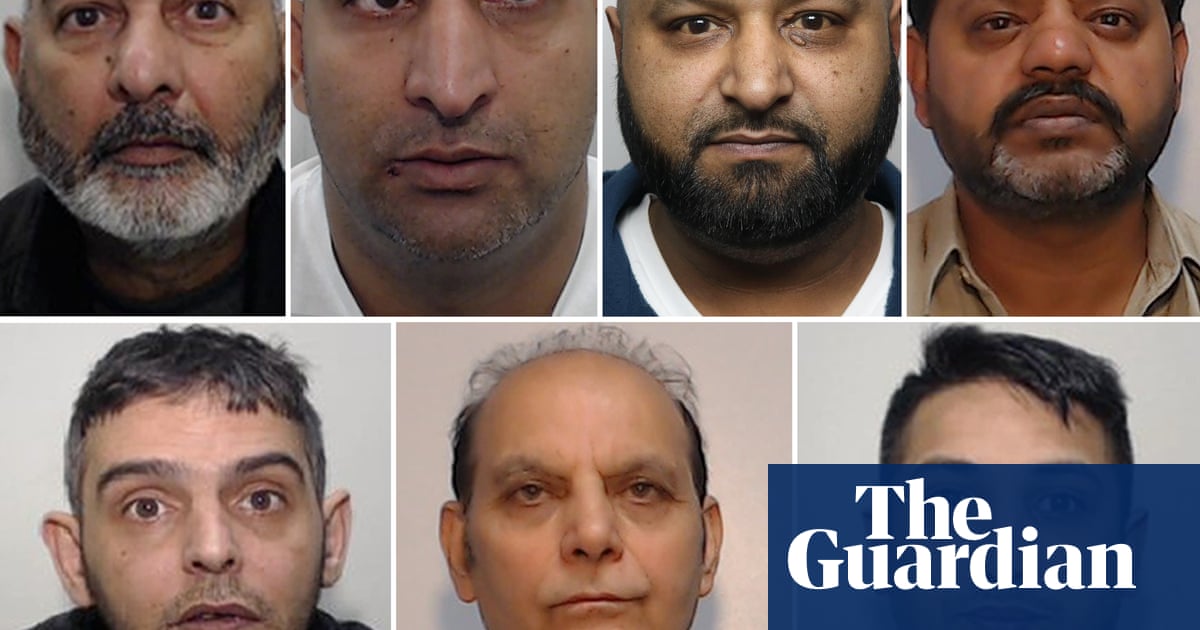Seven men who groomed and treated as “sex slaves” two vulnerable teenage girls in Rochdale have been found guilty of multiple sex offences.
A long running trial in Manchester heard that the men subjected the girls to years of misery and expected them to have sex with them “whenever and wherever they wanted”.
Both girls had deeply troubled home lives and were given drugs, alcohol, cigarettes, places to stay and people to be with, a jury heard. The crimes took place in filthy flats, on rancid mattresses, in cars, car parks, alleyways, disused warehouses and moors, the court was told.
The crimes all happened, prosecutor Rossano Scamardella KC told a jury at Manchester Minshull Street crown court, “under the noses of social workers and others who should have done far more to protect them”.
After a four-month trial and three weeks of deliberation a jury on Friday returned unanimous guilty verdicts for 50 offences committed between 2001 and 2006.
After the verdicts DCI Guy Laycock, the senior investigating officer on the case, paid tribute to the two survivors, known throughout the trial as Girl A and Girl B.
“They have been pivotal in bringing these abusers to long-awaited justice by bravely giving painful and difficult testimony during a four-month trial,” he said. “Without them this would not be possible and today is about them.
“These seven men preyed on vulnerability for their own depraved sexual gain. The men abused, degraded and then discarded the victims when they were just children. This horrific abuse knew no limits, despite their denials throughout this lengthy investigation and court case.
“They had a callous disregard for these women when they were girls, and continue to show no remorse for their unforgivable actions all these years later.”
Three of the abusers, Mohammed Zahid, 64, Mushtaq Ahmed, 67, and Kasir Bashir, 50 – all born in Pakistan – were stallholders on Rochdale’s indoor market.
Zahid, a father of three who was known as Boss or Bossman, gave free underwear from his lingerie stall to both survivors and also money, alcohol and food and in return expected them to have regular sex with him and his friends.
In 2016,Zahid was jailed for five yearsin an earlier grooming gang case after he engaged in sexual activity in 2006 with a 15-year-old girl who he met when she visited his stall to buy tights for school.
Bashir did not attend the current trial and jurors were ordered not to speculate why. It can be revealed that he absconded while on bail before the trial got under way.
It can also be reported that co-defendants Mohammed Shahzad, 44, Naheem Akram, 48, and Nisar Hussain, 41, were remanded in custody with their bail revoked in January before the jury was sworn in.
Police received intelligence that the three Rochdale-born taxi drivers were planning to leave the UK and had already paid a deposit for their transport, the court heard.
All three denied the accusation but Judge Jonathan Seely said the court was not prepared to take a risk that they too would abscond.
A seventh defendant, Pakistani-bornRoheez Khan, 39, was also convicted in a previous Rochdale grooming trial. In 2013 he was one of five men convicted of sexually exploiting a “profoundly vulnerable” 15-year-old girl in 2008 and 2009. He was jailed for six-and-a-half years for engaging in sexual activity with a child and witness intimidation.
Girl A told the jury she could have been targeted by more than 200 offenders but said “there was that many it was hard to keep count”.
The trial heard that Girl B was labelled a “prostitute” from the age of 10 by social workers in Rochdale.
Giving evidence, she said that social workers raised concerns with her that she may be having sex with Asian men.
“They said I was a prostitute. I was prostituting myself … I don’t remember them being concerned enough to do anything about it.
“I remember knowing that they knew what was going on.”
All the perpetrators were prosecuted as part of Operation Lytton, an ongoing investigation since 2015 byGreater Manchesterpolice into non-recent child sexual exploitation in Rochdale.
Thirty-seven individuals have been charged so far, with five more trials scheduled to take place from September onwards.
In the UK, theNSPCCoffers support to children on 0800 1111, and adults concerned about a child on 0808 800 5000. The National Association for People Abused in Childhood (Napac) offers support for adult survivors on 0808 801 0331. In the US, call or text theChildhelpabuse hotline on 800-422-4453. In Australia, children, young adults, parents and teachers can contact theKids Helplineon 1800 55 1800, orBraveheartson 1800 272 831, and adult survivors can contactBlue Knot Foundationon 1300 657 380. Other sources of help can be found atChild Helplines International
